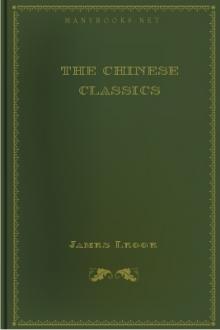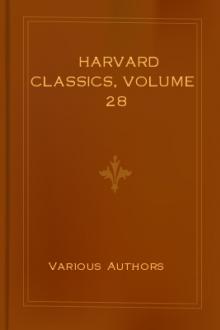The Chinese Classics, James Legge [the chimp paradox .txt] 📗

- Author: James Legge
- Performer: -
Book online «The Chinese Classics, James Legge [the chimp paradox .txt] 📗». Author James Legge
1 ���������, the same who is mentioned in the Analects, V. xiv.
2 See the ������, ���������������.
3 Ana. II. iv. 6.
4 See the ������, ������������, p. 12.
5 Ana. IX. xiv.
6 Ana. VII. xvi.
additional impost which he wished to lay upon the people, but Confucius refused to give any reply, telling the disciple privately his disapproval of the proposed measure. It was carried out, however, in the following year, by the agency of Yen, on which occasion, I suppose, it was that Confucius said to the other disciples, ‘He is no disciple of mine; my little children, beat the drum and assail him [1].’ The year B.C. 483 was marked by the death of his son Li, which he seems to have borne with more equanimity than he did that of his disciple Yen Hui, which some writers assign to the following year, though I have already mentioned it under the year B.C. 489.
In the spring of B.C. 481, a servant of Chi K’ang caught a Ch’i-lin on a hunting excursion of the duke in the present district of Chia-hsiang [2]. No person could tell what strange animal it was, and Confucius was called to look at it. He at once knew it to be a lin, and the legend-writers say that it bore on one of its horns the piece of ribbon, which his mother had attached to the one that appeared to her before his birth. According to the chronicle of Kung-yang, he was profoundly affected. He cried out, ‘For whom have you come? For whom have you come?’ His tears flowed freely, and he added, ‘The course of my doctrines is run [3].’
Notwithstanding the appearance of the lin, the life of Confucius was still protracted for two years longer, though he took occasion to terminate with that event his history of the Ch’un Ch’iu. This Work, according to Sze-ma Ch’ien, was altogether the production of this year, but we heed not suppose that it was so. In it, from the standpoint of Lu, he briefly indicates the principal events occurring throughout the country, every term being expressive, it is said, of the true character of the actors and events described. Confucius said himself, ‘It is the Spring and Autumn which will make men know me, and it is the Spring and Autumn which will make men condemn me [4].’ Mencius makes the composition of it to have been an achievement as great as Yu’s regulation of the waters of the deluge:— ‘Confucius completed the Spring and Autumn, and rebellious ministers and villainous sons were struck with terror [5].’
Towards the end of this year, word came to Lu that the duke
1 Ana. XI. xvi.
2 ������������������.
3 ���������, ���������������. According to Kung-yang, however, the lin was found by some wood-gatherers.
4 Mencius III. Pt. II. ix. 8.
5 Mencius III. Pt. II. ix. 11.
of Ch’i had been murdered by one of his officers. Confucius was moved with indignation. Such an outrage he felt, called for his solemn interference. He bathed, went to court, and represented the matter to the duke, saying, ‘Ch’an Hang has slain his sovereign, I beg that you will undertake to punish him.’ The duke pleaded his incapacity, urging that Lu was weak compared with Ch’i, but Confucius replied, ‘One half the people of Ch’i are not consenting to the deed. If you add to the people of Lu one half the people of Ch’i, you are sure to overcome.’ But he could not infuse his spirit into the duke, who told him to go and lay the matter before the chiefs of the three Families. Sorely against his sense of propriety, he did so, but they would not act, and he withdrew with the remark, ‘Following in the rear of the great officers, I did not dare not to represent such a matter [1].’
In the year B.C. 479, Confucius had to mourn the death of another of his disciples, one of those who had been longest with him, the well-known Tsze-lu. He stands out a sort of Peter in the Confucian school, a man of impulse, prompt to speak and prompt to act. He gets many a check from the master, but there is evidently a strong sympathy between them. Tsze-lu uses a freedom with him on which none of the other disciples dares to venture, and there is not one among them all, for whom, if I may speak from my own feeling, the foreign student comes to form such a liking. A pleasant picture is presented to us in one passage of the Analects. It is said, ‘The disciple Min was standing by his side, looking bland and precise; Tsze-lu (named Yu), looking bold and soldierly; Yen Yu and Tsze-kung, with a free and straightforward manner. The master was pleased, but he observed, “Yu there!— he will not die a natural death [2].”’
This prediction was verified. When Confucius returned to Lu from Wei, he left Tsze-lu and Tsze-kao [3] engaged there in official service. Troubles arose. News came to Lu, B.C. 479, that a revolution was in progress in Wei, and when Confucius heard it, he said, ‘Ch’ai will come here, but Yu will die [4].’ So it turned out. When Tsze-kao saw that matters were desperate he made his escape, but Tsze-lu would not forsake the chief who had treated
1 See the ������, ��������������� and Analects XIV. xxii.
2 Ana. XI. xii.
3 ������, by surname Kao (���), and name Ch’ai (���).
4 See the ������, ���������������.
him well. He threw himself into the melee, and was slain. Confucius wept sore for him, but his own death was not far off. It took place on the eleventh day of the fourth month in the same year, B.C. 479 [1]. Early one morning, we are told, he got up, and with his hands behind his back, dragging his staff, he moved about by his door, crooning over,—
‘The great mountain must crumble;
The strong beam must break;
And the wise man wither away like a plant.’
After a little, he entered the house and sat down opposite the door. Tsze-kung had heard his words, and said to himself, ‘If the great mountain crumble, to what shall I look up? If the strong beam break, and the wise man wither away, on whom shall I lean? The master, I fear, is going to be ill.’ With this he hastened into the house. Confucius said to him, ‘Ts’ze, what makes you so late? According to the statutes of Hsia, the corpse was dressed and coffined at the top of the eastern steps, treating the dead as if he were still the host. Under the Yin, the ceremony was performed between the two pillars, as if the dead were both host and guest. The rule of Chau is to perform it at the top of the western steps, treating the dead as if he were a guest. I am a man of Yin, and last night I dreamt that I was sitting with offerings before me between the two pillars. No intelligent monarch arises; there is not one in the kingdom that will make me his master. My time has come to die.’ So it was. He went to his couch, and after seven days expired [2].
Such is the account which we have of the last hours of the great philosopher of China. His end was not unimpressive, but it was melancholy. He sank behind a cloud. Disappointed hopes made his soul bitter. The great ones of the kingdom had not received his teachings. No wife nor child was by to do the kindly offices of affection for him. Nor were the expectations of another life present with him as he passed through the dark valley. He uttered no prayer, and he betrayed no apprehensions. Deep-treasured in his own heart may have been the thought that he had endeavoured to serve his generation by the will of God, but he gave no sign. ‘The mountain falling came to nought, and the rock was removed
1 See the ������, ���������������, and Chiang Yung’s Life of Confucius, in loc.
2 See the Li Chi, II, Sect. I. ii. 20.
out of his place. So death prevailed against him and he passed; his countenance was changed, and he was sent away.’
10. I flatter myself that the preceding paragraphs contain a more correct narrative of the principal incidents in the life of Confucius than has yet been given in any European language. They might easily have been expanded into a volume, but I did not wish to exhaust the subject, but only to furnish a sketch, which, while it might satisfy the general reader, would be of special assistance to the careful student of the classical Books. I had taken many notes of the manifest errors in regard to chronology and other matters in the ‘Narratives of the School,’ and the chapter of Sze-ma Ch’ien on the K’ung family, when the digest of Chiang Yung, to which I have made frequent reference, attracted my attention. Conclusions to which I had come were confirmed, and a clue was furnished to difficulties which I was seeking to disentangle. I take the opportunity to acknowledge here my obligations to it. With a few notices of Confucius’s habits and manners, I shall conclude this section.
Very little can be gathered from reliable sources on the personal appearance of the sage. The height of his father is stated, as I have noted, to have been ten feet, and though Confucius came short of this by four inches, he was often called ‘the tall man.’ It is allowed that the ancient foot or cubit was shorter than the modem, but it must be reduced more than any scholar I have consulted has yet done, to bring this statement within the range of credibility. The legends assign to his figure ‘nine-and-forty remarkable peculiarities [1],’ a tenth part of which would have made him more a monster than a man. Dr. Morrison says that the images of him which he had seen in the northern parts of China, represent him as of a dark, swarthy colour [2]. It is not so with those common in the south. He was, no doubt, in size and complexion much the same as many of his descendants in the present day. Dr. Edkins and myself enjoyed the services of





Comments (0)